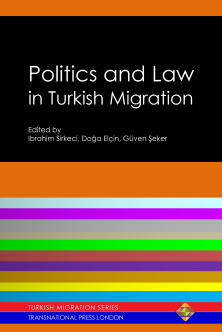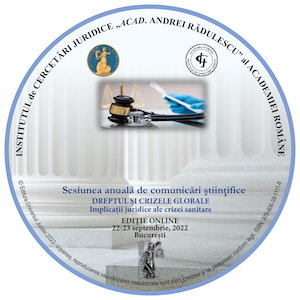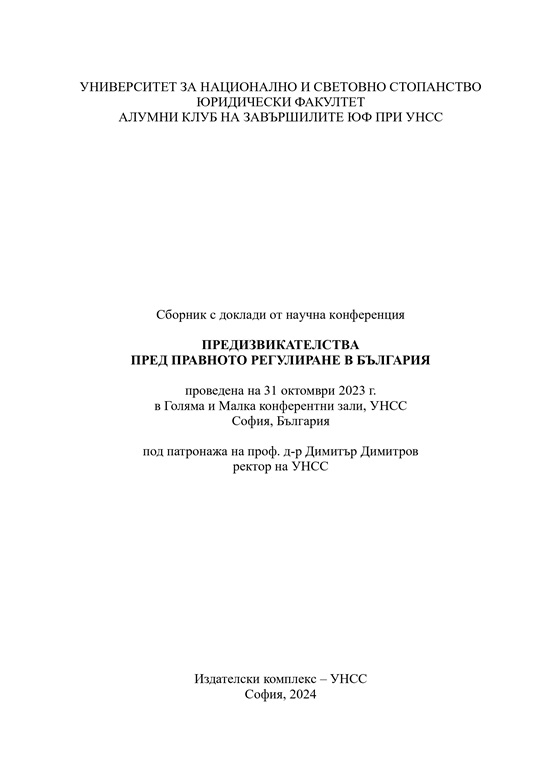
We kindly inform you that, as long as the subject affiliation of our 300.000+ articles is in progress, you might get unsufficient or no results on your third level or second level search. In this case, please broaden your search criteria.


The study aims to analyze the reaction of legal systems to the convulsions in European society caused by the Covid-19 health crisis, the war in Ukraine and the revocation of abortion rights in the U.S. With a cross-cutting approach, the article seeks to leave in the reader's mind a non-exhaustive overview of the limits of his rights through the sometimes-disproportionate reactions of the state. Extraordinary events, however, they are not a novelty for humanity. The question therefore arises as to whether the "violence" of restrictive measures on fundamental human rights could be prevented. Then, by approaching a state of emergency as normal, have human rights undergone a transformation in their substance? From a subjective point of view, the study takes stock of the legal war waged by the international community against the armed war since the end of World War II. War sometimes waged in the name of human rights, through the belligerent events of Eastern Europe, proves to us that it is not over yet and new appropriate legal measures are required. What will be the legal consequences of these is another issue discussed in the article.
More...
The draft amendment to the Constitution of the Republic of Bulgaria from 2023 contains numerous proposals that are within the competence of the Grand National Assembly. This conclusion is based on a comparison of the content of proposed changes with the established practice of the Constitutional Court of the Republic of Bulgaria regarding the "form of government" in the sense of Art. 158, item 3 of the operation of the Constitution. It is indisputable that the discussion needs to be changed in the Basic Law and if it is to be entirely political in nature. But in view of the basic constitutional principles - rule of law, people's sovereignty, separation of powers and independence from the judiciary, proclaimed in the Basic Law, the political decisions of this discussion should undoubtedly be in line with them.
More...
It is a fundamental rule in the constitution of a democratic state to contain provisions related to changes to the basic law. Such was the understanding of the creators of the Constitution of the Republic of Bulgaria from 1991, who provided for such a legal regulation. It is contained in Chapter Nine of our basic law, entitled "Amendment and addition to the Constitution. Adoption of a new Constitution" - Art. 153 to Art. 163. Challenges in legal regulation related to changes in the Constitution are outlined according to material criteria and are fastened with special procedural guarantees in our basic law. In the exposition below, attention will be paid to some main points contained in the constitutional legal framework for revision of the Constitution by the National Assembly. The very fact that this activity is different from the usual daily legislative function of the parliament shows that the National Assembly is faced with the challenge of carrying out the changes in the basic law, considering all the features and specifics laid down in the constitutional law.
More...
India is one of the few countries in the world with a definition of "well -known" in its national trademark law. India is also one of the last countries to ratify the WTO Agreement on Trade-Related Aspects of Intellectual Property. What are the legal and economic reasons for India to opt for a legislative approach for prior administrative registration of 'well-known' trademarks, given that the countries of the European Union abandoned this legal institution in their laws a decade ago?
More...
Some decisions of the Supreme Court of Cassation are examined in this article, related to special hypotheses of property improvement: impensae voluptariae, the improvements made by the owner of mortgaged property, the liability in case of transferring the property or the possession, the extinctive prescription for the claim of the tenant.
More...
The text covers issues related to copyright in the context of artificial intelligence (AI). It emphasizes the need for clear legal frameworks to regulate works created by AI, especially in cases involving Strong and Generative AI. The idea is that such programs generate works that don't entirely match the characteristics of human creators. It discusses questions of authorship and rights, proposing various alternatives to resolve conflicts, including granting rights to the programmer or the program itself. The text expresses the need for swift and appropriate legislation capable of justifying and protecting the rights of all participants in the process of creating works through artificial intelligence.
More...
Impact assessment originated in the USA in the 1970s. Subsequently, almost all countries in the developed world introduced various forms of regulatory impact analysis and assessment. In Bulgaria, impact assessment has been talked about since the beginning of the 21st century. The creation of a legal framework, methodological documentation and administrative capacity begins. Academia and some non-governmental organizations are actively involved in the noble undertaking. Various programs and projects are being implemented. However, during the first 15 years, there were no serious practical results. In 2016, the impact assessment received its (long-awaited) legal regulation. A series of by-laws and methodological documents follows. A certain administrative capacity is being formed. There are decisive steps in the right direction and the results (although still modest) are not long in coming. This scientific report is dedicated to the genesis and development of impact assessment, the current regulation and practical impact assessment in Bulgaria over the last 7 years.
More...
In Interpretative Decision No 5/2021, the SCC ruled on the labour law issue of the application of the new ground for dismissal of pedagogical specialists, in respect of which a contradictory practice of the SCC itself has accumulated since 2016. Since dismissal ground is conviction for a crime, the problem has significant criminal law aspects that the SCC has not taken into account, which is why the argumentation of the decision and the dissenting opinion suffer from serious imperfections.
More...
Among the goals pursued by law are justice, the common good and legal certainty. Legal certainty as a goal of law is also a value of the law itself and is part of its concept. The approach to its definition opens up avenues in different directions to be explored. This report will analyze the various meanings, arising from its main divisions, its main manifestations in the legal system and its main problems.
More...